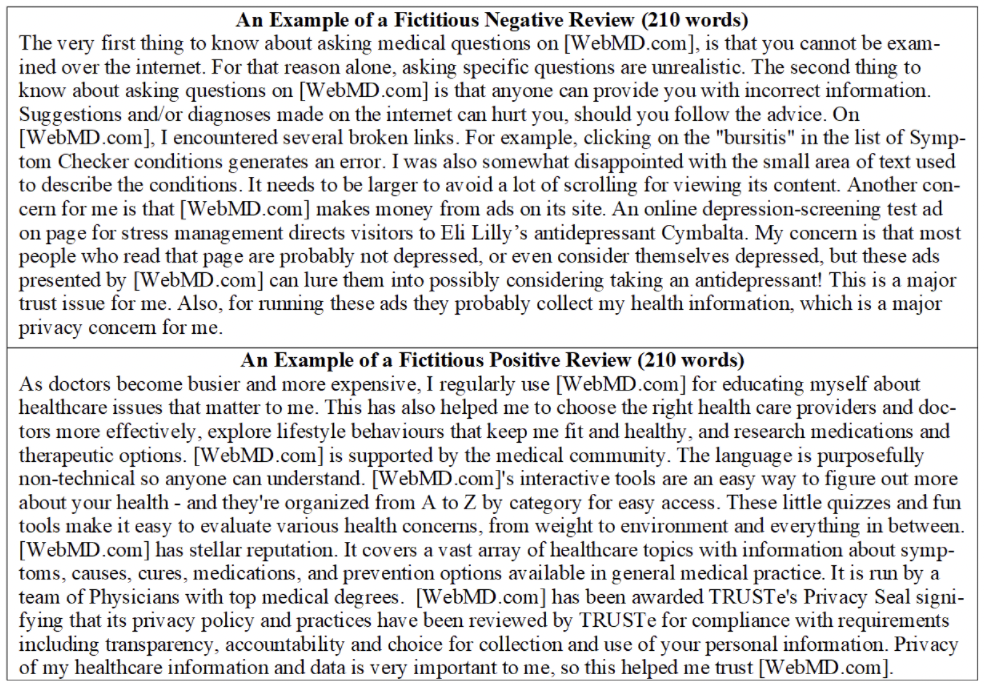
When you ask someone how they’re doing, a response like “I’m good” is almost expected, and doesn’t carry much weight in the ensuing conversation.
“But, the moment a person says, ‘I’m not doing well,’ it makes you say, ‘there’s something wrong for sure,’ and you begin to listen more closely,” said Hamed Qahri-Saremi, an assistant professor for Computer Information Systems in the Colorado State University College of Business. “Once you hear that negative information, it gives you more cues as compared to the expected positive information to make a decision. it changes your attitude more strongly.”
This same principle can be applied to online services, and more specifically, negative and positive reviews about online services. It’s the subject of Qahri-Saremi’s latest research paper, “Negativity Bias in the Diagnosticity of Online Review Content: The Effects of Consumers’ Prior Experience and Need for Cognition,” which was recently accepted for publication in the European Journal of Information Systems.
While previous literature has focused on consumers’ behavior and things like star ratings, Qahri-Saremi and his co-author delved into the actual content of online reviews.

“Negativity bias in the diagnosticity of online review content: the effects of consumers’ prior experience and need for cognition”
Hamed Qahri-Saremi, Ali Reza Montazemi1
European Journal of Information Systems
1 DeGroote School of Business, McMaster University
For customers who are already well-informed about the product or service that they’re researching, Qahri-Saremi found that negative reviews have significantly more impact than positive ones.
“Those experienced and involved consumers actually reacted more strongly when they saw negative information,” Hamed said. “Negative content was far more likely to sway the mindset of these people as compared to positive reviews, which means those negative reviews can be much more severe and negative for the businesses because experienced and involved consumers are arguably the more important segment of consumers for online service providers.
“Their opinions also matter for future potential consumers more than novice and uninvolved consumers.”
How the study worked
To conduct the study, Qahri-Saremi and his co-author developed their own fake 210-word positive and negative reviews, based on similar reviews on platforms such as Yelp and Tripadvisor, for two types of online services: online music streaming services and online health care services. They controlled the other important factors such as source reputation and online review quality and length across all reviews.
A group of undergraduate business students were told to read those reviews and rate how likely they were to use the online service in light of that information. Given their demographics, Qahri-Saremi said students were much more experienced and involved with online music streaming services as compared to online healthcare services.
For the study, none of the students had used the online service that was assigned to them, but prior experience with the domain of online service nevertheless was shown to matter.
Students evaluating online health care services – a domain they were less familiar with – were almost equally affected by positive and negative reviews.
“Their attitudes were swayed with the valence of the content of the review. No matter whether the review was positive or negative, it influenced their attitude” Hamed said.
When it came to music, it was a different story. Since students knew more about online music services, they were more likely to be swayed by bad reviews. Conversely, positive ones had less of an impact.
“Negative information tends to be more specific and diagnostic than positive information, and that is why it is given more weight and makes decision-making easier,” Hamed said. “This has more effect on consumers who have the ability and motivation to leverage that information for decision making. Therefore, we observe a larger effect of negativity bias on more experienced and involved consumers.”

This shows examples of the fictitious positive and negative reviews that Hamed and his co-author wrote for their study.
Lessons for businesses
The phrase “any publicity is good publicity” does not necessarily apply to online reviews, especially given that Qahri-Saremi’s research shows that an unfavorable comment can sway the experienced consumers that businesses want most.
“Those reviews can get more attention and lead to much more severe consequences,” he said.
This means that an effective response to a negative review is critical. Qahri-Saremi said while it may not be feasible to respond to every single negative review, businesses should find ways to rectify the most damaging potential comments, be it through apologies, compensation or explanations.
“You want to protect the most important segment of consumers you have,” he said.
How much should consumers think about negative reviews?
Given his field of study, it’s not a shock that Qahri-Saremi scours online reviews before he makes purchases.
“I usually look at the most recent reviews, probably from the past three or so months,” he said. “Then I try to find the ones that are more elaborate, that explain a bit more, and the ones that discuss personal experiences with the product or service.”
And, like the people in his research, Qahri-Saremi said he’s naturally drawn to negative information. There is one difference, though.
“I get more information from the negative reviews because they are often more specific and elaborate, but interestingly, it happens sometimes that I then decide to buy or try the product,” Qahri-Saremi said. “It happens that the things that are not satisfactory to that consumer are things that I don’t care about. And I can make such a judgment because the information in the negative reviews are often more elaborate.”
And that’s Qahri-Saremi’s advice to consumers: to avoid the natural emotional response to negative information and to think critically about all the information at hand.
“I believe our attraction to negative information is natural, it’s part of our decision-making process as we scour for more diagnostic and richer information cues,” Qahri-Saremi said. “But, don’t just focus on the negative. Instead, focus on the overall picture and what that information means for your decision.”
About CSU’s College of Business
The College of Business at Colorado State University is focused on using business to create a better world.
As an AACSB-accredited business school, the College is among the top five percent of business colleges worldwide, providing programs and career support services to more than 2,500 undergraduate and 1,300 graduate students. Faculty help students across our top-ranked on-campus and online programs develop the knowledge, skills and values to navigate a rapidly evolving business world and address global challenges with sustainable business solutions. Our students are known for their creativity, work ethic and resilience—resulting in an undergraduate job offer and placement rate of over 90% within 90 days of graduation.
The College’s highly ranked programs include its Online MBA, which has been ranked the No. 1 program in Colorado by U.S. News and World Report for five years running, and the Impact MBA, recognized by Corporate Knights as a Top 20 “Better World MBA” worldwide.